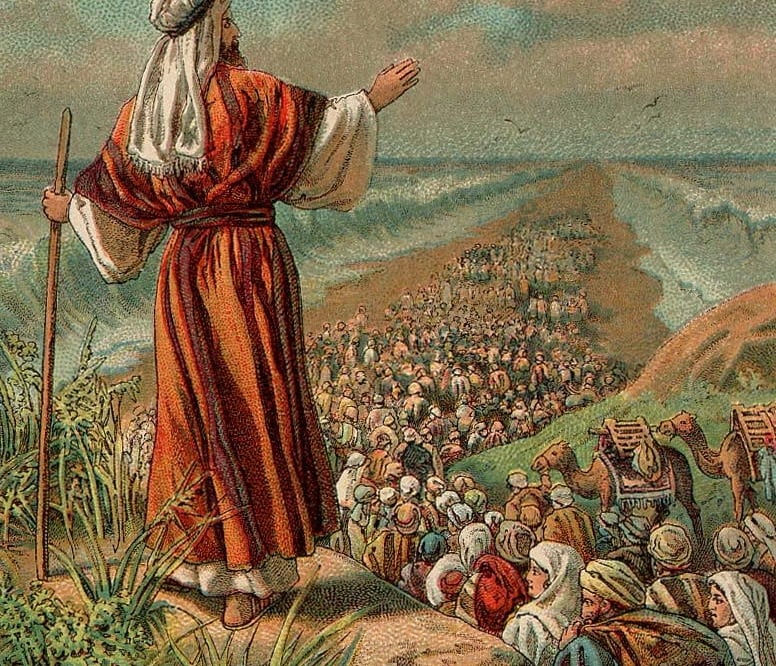

Jacob, grandson of the great patriarch Abraham—the foundational figure of Judaism, Christianity, and Islam—is central to the story of Israel. According to tradition, Jacob wrestled an angel through the night until dawn without relenting. The angel later renamed Jacob as Israel. Israel means struggling with God and ending up prevailing, albeit with God’s blessing. This pivotal moment defined not just Jacob, but the nation born from him. Jacob fathered twelve sons, whose descendants formed the Twelve Tribes of Israel – collectively known as the Israelites. Israelites lived in the region of Canaan from approximately 1800 BC. Canaan is the same region that modern-day Israel, Palestine, Lebanon, parts of Syria, and Jordan encompass.
The 12 tribes were semi-nomadic pastoral people. Although originally settling in Canaan, many members of the tribes migrated to Egypt sometime in the 1700s and 1600 BC. Moses, the great-great-grandson of Jacob is credited with receiving and transmitting the Torah (holy book of the Jews), forming the bedrock of Jewish law and religious practices. He led the Israelites out of Egypt to return to Canaan, in line with God's promise to Abraham to gift the land of Canaan to Abraham's descendants. It is said that God wanted to punish the Canaanites for their immoral practices, like child sacrifice, idolatry, and adultery, by giving their land to His obedient and faithful disciple, Abraham.
Joshua succeeded Moses as the leader of the Israelites. After Moses, Joshua battled against various Canaanite kingdoms and tribes to claim several parts of Canaan. He successfully coalesced most of the Israelites back into the land of Canaan around 1400 BC. The once semi-nomadic pastoral tribes started doing agriculture, and made it their primary occupation. Though many Israelites started living in Canaan, the Egyptians dominated the region between 1550 to 1200 BC. According to sources, the first evidence of people in Canaan referring to themselves as Israelites was during 1200 BC. The Israelites then started moving further into the hinterlands of Canaan. The Canaanites, who still held the stronger cities of the region, opposed their movement but lost much of their territory. In the following century, the Philistines, who came from Crete, invaded Canaan and furthered weakened the indigenous Canaanites.
The ancient Israelites living between the 15th and 11th century BC practiced self-governance. Each of the 12 tribes had a judge. The judges predate the time of kings. The judges served as military, civil, and spiritual guides for the Israelites in the period between the death of Joshua to 1024 BC. The Israelites united under a single king in around 1024 BC, establishing the era of the United Kingdom of Israel. King Saul was the first king. King David (fighting Goliath fame), who succeeded King Saul, established Jerusalem as the capital.
Under the leadership of King David (10th century BC), the Israelites broke the Philistines' hold of parts of Canaan and also vanquished the remaining native Canaanites, taking over the city of Jerusalem. Thereafter Canaan became, for all practical purposes, the Land of Israel. Though Abraham did not receive the promised land in his lifetime, his descendants eventually succeeded in settling there and riding the place of any native Canaanites. God's "Promised Land" was finally delivered to the Israelites. And, God's desire to punish the Canaanites was fulfilled, as well.
King David's son, King Solomon, built the first temple in Jerusalem in 957 BC. However, after the death of King Solomon, the kingdom was split into two due to a revolt against excessive tax levies. The two split kingdoms were called the Northern Kingdom of Israel (capital: Samaria) and the Southern Kingdom of Judah (capital: Jerusalem). The Northern kingdom fell to the Assyrian Empire in 722 BC. The Babylonians conquered the Southern kingdom of Judah in 586 BC. The Babylonians crushed the attempted incursion of the Egyptian subsequently. They also destroyed the first temple (of immense Jewish significance) built by King Solomon.
Subsequently, several major empires seized Canaan over the centuries. Ancient Canaan came under the successive rule of the following major empires: the Persians, Alexander the Great's Macedonians, Hellenistic dynasties, the Romans, the Arabs, the Turks (Ottoman), and then the British. On May 14, 1948, Israel, as we know today, was created. But modern-day Israel encompasses only a tiny portion of the once vast region of the United Kingdom of Israel. A citizen of modern-day Israel is called Israeli, and not Israelite. The ancient Israelite religion underwent significant development, evolving ultimately into Rabbinic Judaism, as practiced today.